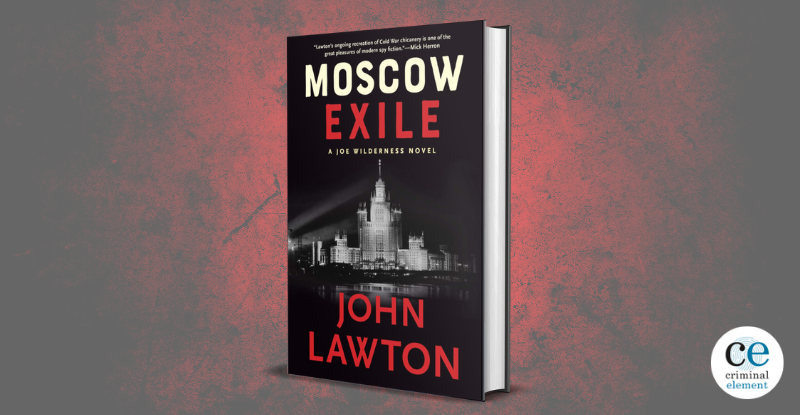Book Review: Moscow Exile by John Lawton
By Janet Webb
May 24, 2023
Moscow Exile initially unfolds as a fast romp through the exploits of British intelligence agents who played for Mother Russia. Intense high-level espionage takes place in Washington, D.C. in the late nineteen-forties, post-war years that encompassed the Red Scare and the McCarthy Hearings. Although it wasn’t much of a romp when aristocratic Englishmen Guy Burgess and Kim Philby defected to Russia. Burgess’s replacement in Washington D.C. is Charlie Leigh-Hunt. Would Charlie have been appointed if his masters had known he too was spying for Moscow? Definitely not.
There’s no reason not to plunge right into Moscow Exile although some of the pleasure of following Joe Wilderness’s erratic spy-craft journey is getting to know his friends and enemies—or should that be frenemies? That seemed the case in Hammer to Fall, the book that precedes Moscow Exile. Even after peace treaties are signed, it seems that spies “simply keep on keeping on.” “Books about spy-craft (fiction and non-fiction) reveal spies have more affinity with their counterparts across the ideological divide than with their masters in the sterile corridors of power.”
The story stretches from the late 1940s to 1969: “Joe Wilderness is stuck on the wrong side of the Iron Curtain, held captive by the KGB, a chip in a game way above his pay grade.” Like countless movies and television series captivated by this time, the action takes place in Berlin and “the famous Bridge of Spies.”
Joe Wilderness grouses at the situation in which he’s landed. He assumes he’s a pawn in a bigger game but if so, who are the participants in this opaque game of chess? Frankly, Joe’s biggest concern is getting out of East Germany alive. Frank, who’s trying to extricate Joe, is fed up with all the shenanigans around Glienicke Bridge—he thinks to himself he should “put up his own shack” on the bridge and “become the CIA’s answer to Elmer Fudd.” He’s exasperated at the clock and dagger tactics of the Russians.
Why did the fuckin’ Russians have to do everything at midnight? What was wrong with two in the afternoon? Back in time for tea. What was wrong with four in the afternoon? Back in time for dinner. Midnight, fuckin’ midnight and his stomach was talking to him. It was saying, “Jack Daniel’s and a hot dog! Jack Daniel’s and a hot dog!” over and over again.
There’s a parallel story to Joe’s forced time in Russia. Charlie Leigh-Hunt, like his colleagues already in Russia, eventually realizes that the West is too hot for him. Time to embrace Mother Russia and defect. Charlie is somewhat of an anti-hero, but he’s a sympathetic character who is very human in his reactions to life’s vicissitudes. He lives a very different life from the more famous defectors, who try to recreate their English lives with Fortnum and Mason baskets and Savile Row tailoring. Charlie is broke and needs to supplement the parsimonious life provided by his Moscow handlers. He finds a job in the publishing industry. Grigory Gerasimovich asks him for his recommendations on “bourgeois fiction.”
Grigory Gerasimovich spun in his chair and threw up a cloud of dust searching on the bottom shelf behind his desk.
“Have only one,” he said at last.
And he set a very old, very dirty copy of Illusions perdues on the desk.
“So sorry, have nothing newer. Is very . . . how say? Grubby?
Charlie gives the book his seal of approval, saying he’s very familiar with it: “You should add it to your catalogue.” His new boss tells him, “Then you read it again. Is what we pay you for.” Gerasimovich will reprint the book in Russian. When Charlie opens the book, he sees it’s a first edition, worth possibly 10,000 pounds. It’s not a stretch to envision Charlie’s side gig. He thinks “somewhere in Moscow there might be a deeply dodgy book dealer who’d pay cash.”
Charlie likes the ladies, always has, and the ladies like him. He’s not particularly discriminating but he falls hard for the delightful Charlotte, another British expat, with whom he enjoyed bedroom sport on an Atlantic ship crossing. He is very surprised to discover that not only does she live in Washington, but she’s famous, knowing everyone worth cultivating (and their secrets). I’m not giving away the house of cards to say that Charlotte’s character is drawn from the exploits of famous socialite Pamela Harriman, whose “first husband was Randolph Churchill, son of Winston.” A major difference between Charlotte and Pamela is that Charlotte, like Charlie, is a fellow traveler. Charlotte is his past and unsurprisingly, Charlie forms a believable romantic relationship in Moscow.
The walk-on characters had me wishing I had a glossary. Thankfully John Lawton kindly provides historical background at the end of the book. In the world Lawton creates, no one ever really disappears forever—they reappear just when they’re most needed (or not, as the case may be). This description is absolutely accurate: “Moscow Exile is a gripping thriller populated by larger-than-life personalities in a Cold War plot that feels strangely in tune with our present,” mostly because it’s impossible to pin down the shifting loyalties of a fabulous cast of spies and their handlers.
What’s next for Joe Wilderness? Countless readers are looking forward to his next adventure.
